The reality for disabled students in Yonsei Univ.
THE MINISTRY of Education, Science, and Technology (MIST)’s 2008 report on universities’ educational welfare for disabled students concluded that 112 out of 192 universities needed improvement. More than half of all Korean universities still lack support for disabled students, degrading their quality of education, and sometimes even infringing on their basic right to move freely around campus and take the courses they want. Among the four categories of evaluation (excellent, good, mediocre, and improvement demanded), Yonsei Univ. was told that its welfare condition for disabled students was “good.”
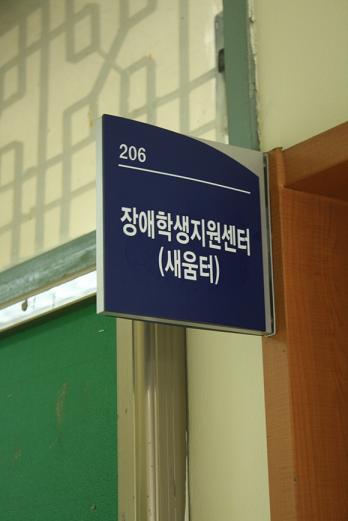 | ||
| Sae-woom-teo, the Disabled Student Support Center | ||
Some distinguishing programs for disabled students in Yonsei Univ.
While there are improvements to be made, there are some impressive programs for disabled students at Yonsei Univ., which were also chosen by the 2008 MIST report as exemplary. For example, the Disabled Student Support Center runs a study tour program for disabled students and student assistants. The study tour to Japan in 2006 aimed at developing the progressive spirits of disabled students and friendship with student assistants. Sixteen disabled students and assistants also visited Vietnam in 2008, had an exchange session with Vietnamese students, and experienced the life of disabled people there. However, it is evident that there is still plenty of room for improvement.
The Yonsei Annals interviewed disabled students attending Yonsei Univ. and asked about their university life.
Eom Ji (Fresh., University College, Natural Science) has a *class III handicap.
Annals: Why did you decide to come to Yonsei Univ.?
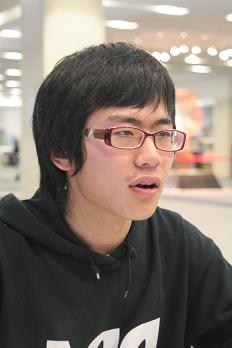 | ||
| Eom Ji (Fresh., University College, Natural Science) | ||
Eom: To be frank, I chose Yonsei Univ. because of its high reputation in Korea just like other students who enter Yonsei Univ. The programs and facilities for disabled students were irrelevant to my choice to attend this school. In fact, Sahmyook Univ. – where I attended for a semester – was better than Yonsei Univ. in terms of programs and facilities for disabled students.
What are some of the difficulties you encounter in university life?
Eom: I am generally satisfied with my university life, but it is difficult for me to walk up staircases or walk long distances since I cannot use one of my legs. However, I have to climb a lot of stairs even when going from one building to another. The greatest thing I consider when enrolling for courses is the location of classrooms and the distances between buildings. It takes me exactly seven minutes to walk from Baikyang Hall to the Science Hall.
What is your opinion about Yonseians’ understanding of disabled people?
Eom: Students seem to lack an understanding of disabled people. As an example, there are so many people using the elevator that sometimes it is impossible for disabled students – people who really need to use the elevator – to get on. Indeed, Yonseians would allow disabled students to ride the elevator first when asked to do so, but they have to know that it is difficult for a disabled student to make such a request. Moreover, I believe that most of the people feel very uneasy about communicating with disabled people because we look different from ordinary students, and we cannot engage in many of the activities that students enjoy doing. I feel a great need for programs that enhance students’ understanding of the disabled.
Have you encountered any additional inconveniences?
Eom: Since I can’t bend my legs, I can’t sit on the narrow seats of the Auditorium where I am required take Chapel. I had to ask the advisor to move my seat to the very front row, where I can sit without folding my legs.
*class III handicap: There are a total of six classes in each category of blind, deaf, and crippled. Class I represents the most severe handicap and class VI the least.
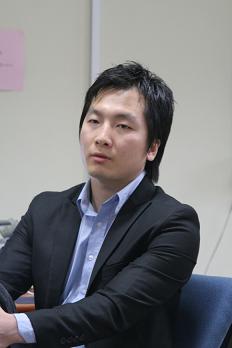 | ||
| Kang Shin-joon (Soph., Dept. of Sport & Leisure Studies) | ||
Kang Shin-joon (Soph., Dept. of Sport & Leisure Studies) is the president of the Student Council for the Disabled.
Annals: What do you think about Yonsei Univ.’s admission process for disabled students?
Kang: Yonsei Univ. has a very negligent admissions process. In order to qualify for special admissions, students only need to get a physical examination at the Severance Rehabilitation Hospital to verify the existence of a physical impairment (class I ~ III). However, Yonsei Univ. needs go beyond confirming the existence of a disability and find out individual differences in disabilities to provide adequate programs and facilities.
Yonsei Univ. received a fairly good grade on the areas of teaching and learning in the MIST report. What do you think about programs that are being implemented for students with disabilities?
Kang: I think it is more problematic that Yonsei Univ. has all the programs in a nominal sense but not in substance. Student assistants do not receive proper training on how to help students with various disabilities. For example, when helping a blind or amblyopic student to a destination, the helper is not supposed to pull him or her along the way – it is a very impolite thing to do. There is a proper way to guide a blind person, but many student assistants are unaware of it due to lack of training.
The limitations of current programs and facilities for disabled students
On the surface, Yonsei Univ. seems to have all the basic programs and facilities that are needed to ensure a satisfactory university life for disabled students. However, the lack of concern for disabled students can be observed all over campus. For example, the newly built Yonsei-Samsung Library, originally forgot to add access gates for wheelchairs. According to Cho Jai-kook (Prof., United Graduate School of Theology, Yonsei Univ.), the advisor to Disabled Student Support Center, “There was no gateway for wheelchairs (the widest gateway on the right side) in the Central Library before I told them to fix it.”
Disabled students are not demanding the school to build elevators in every single building on the campus. Kim Eul-hwan (Sr., Dept. of Psych.), who lives in a wheelchair due to a class II handicap says, “I know that Underwood Hall, where a lot of administrative departments are located, cannot accommodate elevators because it was designated a cultural property.” However, there should be handicap facilities – like elevators or ramps – in frequently visited buildings like Baikyang Hall and the Student Union.
In addition, there is not even one specialist or administrative division that is exclusively responsible for disabled students. There are assistant instructors, who take turns being on duty, at Sae-woom-teo, a lounge for disabled students. However, these assistants are also students who have their own work to do, which means that they might not be able to help disabled students in emergency situations. Kim asserts, “I believe that it would be much better if there were a permanent staff member at the Disabled Student Support Center. Every time a new assistant instructor comes on duty, he or she asks me about the facilities and how the center is run. There is a great need for a more systematic management of the assistants.”
Another problem is that there are no specific provisions for disabled students regarding various conveniences and academic systems in Yonsei Univ. Since nothing is institutionalized yet, disabled students have to elbow their way through in order to have priority in course enrollment or dormitory application. Disabled students have to explain their situation to each department and ask the administrative personnel to provide special considerations.
Finally, there is a great lack of financial resources. Cho says, “It is not exaggeration to say that the school is not providing any kind of financial support for disabled students. We are funded by the government or private donations.” About 20 million out of 100 million that was donated by a number of professors is spent annually for disabled students in Yonsei Univ.
Library facilities for disabled students
- The size of writings on signs should be enlarged.
- There should be a separate road for wheelchairs on Baikyang-ro.
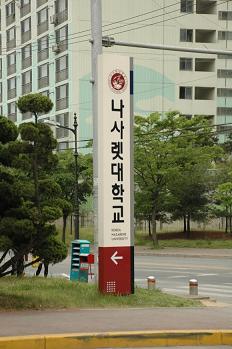 | ||
- Sinks, toilets, card identification entrances, and ticketing machines in the Central Library should be lowered for wheelchairs.
- Facilities for disabled students are located in remote areas: unequal access compared to mainstream students.
- The Information Commons section of the Yonsei-Samsung Library are all stairs → the elevator only operates up to the 1st floor.
- Disabled students cannot enter the Yonsei-Samsung Library through the main entrance; they have to go around the library to the rear entrance near the gymnasium.
Other general improvements to be made
- There are no elevators in the old buildings of Yonsei Univ. (e.g. Yongjae Hall, the Student Union, Baikyang Hall).
- There are almost no braille blocks or signs for blind or amblyopic students.
- There are only a few automatic doors at Yonsei Univ. (almost none of the doors to classrooms).
Toward a better university life for disabled students
Yonsei Univ. has three main problems regarding the programs and facilities for disabled students: nominal supporting programs; lack of facilities; and the low level of awareness and understanding about the present problems. These shortcomings hinder disabled students’ quality of education, mobility around the campus, and access to useful information. Korea Nazarene Univ. (KNU) can be a good role model for Yonsei Univ., considering the various services and facilities provided by it.
At Korea Nazarene Univ. (KNU), more than 7% of total students are disabled. There are 383 students with disabilities among a total of about 5,000 students. It was rated as “excellent” in the MIST’s welfare report for three nonconsecutive years ’03, ’05, and ’08. Among the 20 universities with “excellent” welfare for disabled students, KNU received the highest score because it made sure that disabled students were enjoying their full right to education by providing sign language and text translation services. Moreover, the linguistic therapy and student assistant programs allowed KNU to provide better services in both education and daily life of disabled students.
Students of KNU have a better understanding and greater awareness of the difficulties of students with disabilities. Yu Han-na (Jr., Dept. of Communication Disorders, KNU) says, “A great deal of my prejudices towards disabled people have been discarded since I started attending this university and seeing the active lives of disabled people everyday.” It is implied in Yu’s comment that part of the reason that KNU students have a better understanding about the disabled is more frequent encounters with them on the campus. Therefore, basic facilities that guarantee the mobility of disabled students is also important in reducing prejudice about them.
Individual-focused programs
Once a disabled student is admitted to KNU, he or she consults with a faculty member according to the type of disability, and the school is informed of the severity of the disability and individual traits. An orientation session exclusively for incoming disabled freshmen is held, where various information about centers and services are provided. With the start of the semester, Individual Support Plans (ISP) are drawn up according to each student’s needs and disability traits, by which various equipments, tools, and services is provided according to individual needs.
Student assistant system
- Traveling assistants (in the case of blind and crippled students)
- Life assistants (in the case of severely disabled students, they need help with eating and other scholarly tasks)
- Night-time assistants (helps as a roommate during the evenings until 9:00a.m. the next morning)
Priorities for disabled students
- Course enrollment is done first by disabled students.
- Disabled students can move into dormitories beforehand, and is arranged to share a room with a student assistant.
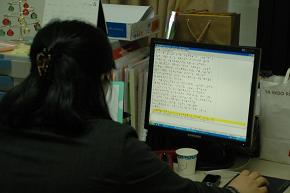 | ||
| Texts are translated into braille. | ||
* * *
The lack of support for and understanding of disabled people have long been regarded as a problem of Korean society. There has been little improvement in the social conditions and needs of disable people. They tend to live a more active life in countries where the welfare for disabled people is more advanced. Universities could become a starting point for a gradual change in the lives of the disabled by providing better academic circumstances and programs that could lead them to a more active life.
Kim Hee-jin
heejin212@yonsei.ac.kr


microsoft windows 7 activation key